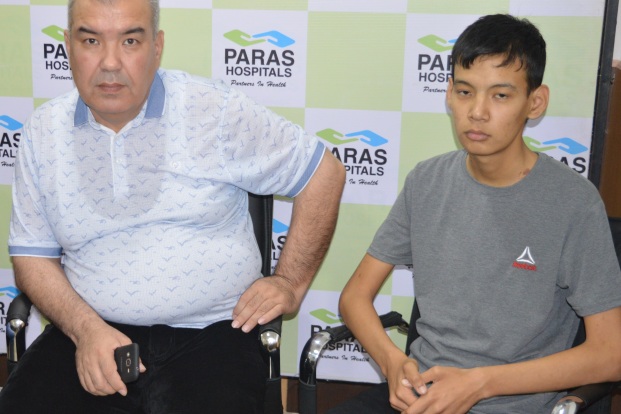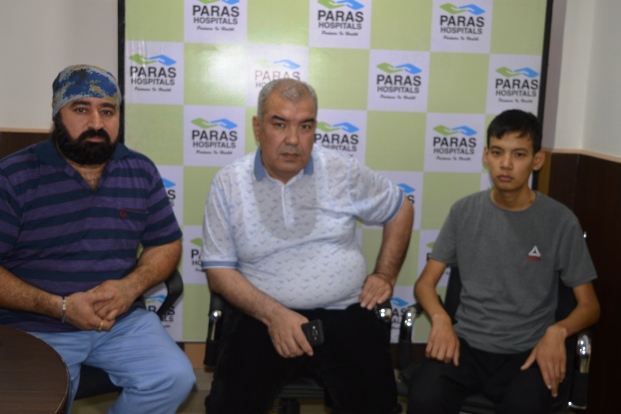Apr 25, 2022
17 yr old Patient from Turkmenistan Undergoes Successful Aortic Valve Replacement at Paras Hospitals, Gurgaon

Doctors at Paras Hospitals, Gurgaon performed an exceptional open heart surgery on a 17 yr old patient from Turkmenistan. This boy, Mr. Yhlasgeldy Sazakov had multilevel left ventricular outflow obstruction, with severe heart failure (LVEF 18%). He complained of breathlessness even on minimal exertion and some times, even at rest(NYHA FC IV). He was experiencing palpitations, fatigue and nausea for more than 7-8 months. Over last 2-3 months he developed extreme swelling all over his body(anasarca). During evaluation in his country he was found to have only one kidney by birth. He consulted few doctors in Turkmenistan and the later also in Germany, he was denied a surgery there, and was rather advised to not get any surgery done as his heart has already failed.

In India post recommendations, he and his family decided to consult Dr Mahesh Wadhwani, Chief of Cardiac Surgery & HOD, Department of Paediatric and Adult Cardiac Surgery, Paras Hospitals, Gurgaon.
Dr Wadhwani is an exemplary surgeon, credited to be part of more than 6000 major heart surgeries over the last 11 years. He trained at Sree Chitra Tirunal Institute for Medical Sciences and Technology, Trivandrum, which is the most premier institute in the field of Cardiothoracic and Vascular Surgery in India. He specializes in pediatric cardiac surgery, Beating Heart CABG, Total arterial Revascularization (TAROPCAB), Valve Replacement/ Valve Repair, Congenital Surgery/Congenital Defects, Atrial Septal Defect(ASD), Ventricular Septal Defect(VSD), Tetralogy of Fallot in Children (TOF), Patent Ductus Arteriosus (PDA), to list a few.
On consultation, Dr Mahesh recommended few OPD tests which highlighted that Mr. Yhlasgeldy Sazakov was suffering from severe aortic stenosis and subaortic membrane with supravalvular aortic stenosis with severe LV dysfunction. In simple terms Yhlasgeldy needed an Aortic Valve Replacement. The surgery was complex and needed additional attention as the patient only had a single kidney, hence focus was needed to ensure that no complications were associated with the same. Initially patient was given a very guarded prognosis, as the outcome of surgery in such patients is very unpredictable, and informed consent for high risk surgery was taken.
Dr Mahesh shares, “Normally, treatment for aortic valve stenosis depends on the severity of your condition, whether you’re experiencing signs and symptoms, and if your condition is getting worse. If your symptoms are mild or you aren’t experiencing symptoms, your doctor may monitor your condition with regular follow-up appointments. Your doctor may recommend you make healthy lifestyle changes and take medications to treat symptoms or reduce the risk of complications. However, you may eventually need surgery to repair or replace the diseased aortic valve. In some cases, your doctor may recommend surgery even if you aren’t experiencing symptoms. If you’re having another heart surgery, doctors may perform aortic valve surgery at the same time. Surgery to repair or replace an aortic valve is usually performed through a cut (incision) in the chest. Less invasive approaches may be available, however surgeons evaluate the condition of the patient to determine if he/she is a candidate for these procedures.”

He further shares, “Mr. Yhlasgeldy Sazakov’s case however, was very different. He was born with this defect and the signs and symptoms associated with the same came under light after 17 yrs. Over last 17 years his aorta did not grow along with his general growth, because of subvalvar and valvar level obstruction. We had to open up the whole aortic root to first visualize the aortic valve, valve itself turned out to be badly diseased and the opening through the valve was hardly 3mm in diameter.We ended up resecting the subvalvar membrane, replacing the aortic valve and augmenmting the ascending aorta with bovine pericardium. Luckily for the patient and us, he responded to surgery exceptionally well, and his heart function improved dramatically after adequate surgery. Without the surgery his life expectancy was less than 1year, now we are hopeful that he will live much longer than that, and more importantly, his quality of life will be much better than what it was. ”
The patient’s renal situation was managed medically. Within 5 days of the surgery, the patient was fit to be discharged.
Mr. Yhlasgeldy Sazakov father shares, “Paras and Dr Mahesh Wadhwani has given our child the gift of life. A few days back our child could not even walk properly and today he is smiling and seems ready to face life. We shall be forever indebted to Dr Mahesh.”

